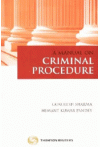- Author(s): Gokulesh Sharma, Hemant Kumar Pandey
- Publisher: Thomson Reuters
- Edition: 1 Ed 2016
- ISBN 10 9384746827
- ISBN 13 9789384746827
- Approx. Pages 474 + Contents
- Format Paperback
- Approx. Product Size 24 x 16 cms
- Delivery Time 3-5 working days (within Kerala & South India) (Others 7-9 days)
- Shipping Charge Extra (see Shopping Cart)
............................................................................................
Description
We have immense pleasure to present A Manual on Criminal Procedure before the legal fraternity, teachers, Judges, Advocates, aspirants of competitive examinations and law students. During our interaction with young advocates, aspirants of competitive examinations and law students, it was felt that there seems to be a crying need for a book on the Code of Criminal Procedure that could fulfil their requirement in a simple manner. Keeping in view this aspect we have prepared this Manual in very simple language which is the first of its own kind. The authors of the Manual ntend to fulfil the need of the knowledge of Criminal Procedure in a graded manner and at the same time packaging it in a capsule form for all the stakeholders. Criminal law, in its wider sense, consists of both the substantive criminal law' and 'procedural criminal law'. The substantive criminal law defines offences and prescribes punishment for the same whereas the procedural criminal law facilitates to administer the substantive law and to protect the society against the criminals and law breakers. The procedural criminal law has been designed to look after the process of administration and enforcement of substantive criminal law. In the absence of procedural law, the substantive criminal law would be of not much importance because without the enforcement mechanism, the threat of punishment held out to the mere formality law breakers by the substantive criminal law would remain and empty practice. Empty threats do not prevent crime and without deterrent effect, the law of crimes would be of hardly any meaning or justification. The purpose of the Criminal Procedure Code and the Penal Code, 1860 is to effectively execute administration of the criminal justice system and protect society from perpetrators of crime. It has a twin purpose; firstly to adequately punish the offender in accordance with law and secondly, to ensure prevention of crime. The Criminal Procedure is a complimentary to the substantive criminal law and failure of the procedure in criminal laws would seriously affect the substantive criminal law.
.........................................................................................
Contents
Chapter 1 : Introduction
Chapter 2 : Definition of Important Terms
Chapter 3 : Powers of the Court
Chapter 4 : Arrest of Persons
Chapter 5 : Processes to Compel Appearance
Chapter 6 : Process to Compel the Production of things
Chapter 7 : Security for Keeping the Peace and for Good Behavior
Chapter 8 : Order for Maintenance of Wives, Children and Parents
Chapter 9 : Maintenance of Public Order and Tranquillity
Chapter 10 : Public Nuisance
Chapter 11 : Preventive action of the Police
Chapter 12 : Information to the Police an their powers to Investigate
Chapter 13 : Jurisdiction of the Criminal Courts in Inquiries and Trials
Chapter 14 : Cognizance of Offences and Commencement of Judicial Proceedings
Chapter 15 : Complaint
Chapter 16 : Supply to the Accused of Copy of Police report and other Documents
Chapter 17 : Charge
Chapter 18 : Trial
Chapter 19 : Trial before a Court of Session
Chapter 20 : Trial of Warrant-Cases by Magistrates
Chapter 21 : Trial of Summons Cases by Magistrate
Chapter 22 : Summary Trial
Chapter 23 : Plea Bargaining
Chapter 24 : Evidence in Inquiries and Trials
Chapter 25 : General Provisions as to Inquiries and Trials
Chapter 26 : Provisions as to Accused Persons of Unsound Mind
Chapter 27 : Provisions as to Offences Affecting the Administration of Justice
Chapter 28 : The Judgment
Chapter 29 : Submission of Death Sentences for Confirmation
Chapter 30 : Criminal Appeals
Chapter 31 : Reference and Revision
Chapter 32 : Revision
Chapter 33 : Transfer of Criminal Cases
Chapter 34 : Execution, Suspension, Remission and Commutation of Sentences
Chapter 35 : Provisions of Bail
Chapter 36 : Irregular Proceedings
Chapter 37 : imitation Taking Cognizance of Certain Offences
Chapter 38 : Miscellaneous
............................................................................................
Author Details
Gokulesh Sharma, H.J.S. District & Session Judge, Uttar Pradesh
Hemant Kumar Pandey, LL.M. (Advocate), State Law Officer (Govt. of Uttar Pradesh) High Court, Lucknow

